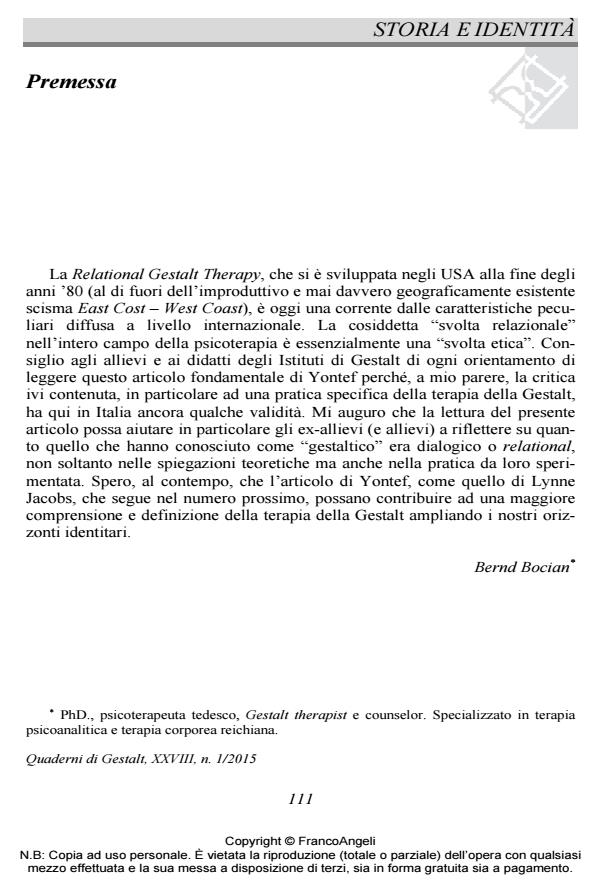L’atteggiamento relazionale nella teoria e nella pratica della terapia della Gestalt
Titolo Rivista QUADERNI DI GESTALT
Autori/Curatori Gary Yontef
Anno di pubblicazione 2016 Fascicolo 2015/1
Lingua Italiano Numero pagine 19 P. 111-129 Dimensione file 108 KB
DOI 10.3280/GEST2015-001009
Il DOI è il codice a barre della proprietà intellettuale: per saperne di più
clicca qui
Qui sotto puoi vedere in anteprima la prima pagina di questo articolo.
Se questo articolo ti interessa, lo puoi acquistare (e scaricare in formato pdf) seguendo le facili indicazioni per acquistare il download credit. Acquista Download Credits per scaricare questo Articolo in formato PDF

FrancoAngeli è membro della Publishers International Linking Association, Inc (PILA)associazione indipendente e non profit per facilitare (attraverso i servizi tecnologici implementati da CrossRef.org) l’accesso degli studiosi ai contenuti digitali nelle pubblicazioni professionali e scientifiche
La teoria della terapia della Gestalt è profondamente relazionale, anche se talvolta viene praticata e teorizzata in maniera non coerente con i suoi principi. Questo articolo esamina i principi relazionali e filosofici fondamentali della terapia della Gestalt: la fenomenologia esistenziale, la teoria del campo e l’esistenzialismo dialogico. Vengono, inoltre, esplorate le loro implicazioni e discusse le pratiche e gli atteggiamenti che risultano incompatibili con i suddetti principi. L’articolo affronta il tema della vergogna e di come questa possa venire provocata o trattata, sia in ambito terapeutico che formativo. Infine definisce chiaramente ciò che è terapia della Gestalt relazionale e ciò che non lo è.
Parole chiave:Epoché, dialogo, teoria del campo, individualismo e interdipendenza, metateoria, fenomenologia, terapia della Gestalt relazionale, vergogna, sottotesto, relazione terapeutica
- Aron L. (1996). A Meeting of Minds: Mutuality in Psychoanalysis. Hillsdale, NJ: The Analytic Press (trad. it.: Menti che si incontrano. Milano: Raffaello Cortina Editore, 2004).
- Beisser A. (1970). The Paradoxical Theory of Change. In: Fagan J., Shepherd I.L., eds., Gestalt Therapy Now: Theory, Techniques, Applications. Palo Alto, CA: Science and Behavior Books, 77-80.
- Husserl E. (1931). Ideas: General Introduction to Pure Phenomenology. New York: Macmillan.
- Hycner R., (1988) Between Person and Person: Toward a Dialogical Psychotherapy. Highland, New York: The Gestalt Journal Press.
- Hycner R., Jacobs L. (1995). The Healing Relationship in Gestalt Therapy: A Dialogic/Self Psychology Approach. Highland, New York: The Gestalt Journal Press.
- Jacobs L. (1989). Dialogue in Gestalt Theory and Therapy. The Gestalt Journal, 12, 1: 25-67.
- Jacobs L. (1992). Insights from Psychoanalytic Self-Psychology and Intersubjectivity Theory for Gestalt Therapists. The Gestalt Journal, 15, 2: 25-60.
- Jacobs L. (1998). Optimal Responsiveness and Subject-Subject Relating. In: Bacal H.A., ed., Optimal Responsiveness: How Therapists Heal Their Patients. Northvale, NJ, & London: Jason Aronson, 191-212.
- Koffka K. (1935). Principles of Gestalt Psychology. New York: Harcourt, Brace & World.
- Lee R., Wheeler G., eds. (1996). The Voice of Shame: Silence and Connection in Psychotherapy. San Francisco, CA: Jossey-Bass.
- Lewin K. (1951). Field Theory in Social Science: Selected Theoretical Papers. New York: Harper.
- Mautner T. (2000). The Penguin Dictionary of Philosophy. New York: Penguin Books.
- McNamee S., Gergen, K.J., eds. (1999). Relational Responsibility: Resources for Sustainable Dialogue. Thousand Oaks, CA: Sage Publications Inc.
- Miller M. (1995). Intimate Terrorism: The Deterioration of Erotic Life. New York: Norton.
- Mitchell A. (1988). Relational Concepts in Psychoanalysis. Cambridge, MA: Harvard University Press. (trad. it.: Gli orientamenti relazionali in psicoanalisi. Per un modello integrato. Torino: Bollati Boringhieri, 1993).
- Mitchell A., Aron L. (1999). Relational Psychoanalysis: The Emergence of a Tradition. Hillsdale, NJ: The Analytic Press.
- Perls F., Hefferline H., Goodman P. (1951). Gestalt Therapy: Excitement and Growth in the Human Personality. New York: The Julian Press (trad. it.: Teoria e pratica della terapia della Gestalt. Roma: Astrolabio, 1997).
- Spinelli E. (1989). The Interpreted World. Newbury Park, CA: Sage.
- Staemmler F.-M. (1993). Therapeutische Beziehung und Diagnose: Gestalttherapeutische Antworten. München: Pfeiffer.
- Staemmler F.-M. (1997). Cultivated Uncertainty: An Attitude for Gestalt Therapists. British Gestalt Journal, 6, 1: 40-48.
- Stolorow R., Brandschaft B., Atwood G. (1987). Psychoanalytic Treatment: An Intersubjective Approach. Hillsdale, NJ: The Analytic Press.
- Wertheimer M. (1945). Productive Thinking. New York: Harper & Row (trad. it.: Il pensiero produttivo. Firenze: Giunti, 1965).
- Wheeler G. (1996). Self and Shame: A New Paradigm for Psychotherapy. In: Lee R., Wheeler G., eds., The Voice of Shame: Silence and Connection in Psychotherapy. San Francisco, CA: Jossey Bass, 23-60.
- Yontef G.M. (1993). Awareness, Dialogue and Process: Essays on Gestalt Therapy. Highland, NY: Gestalt Journal Press. Yontef G.M. (1997a). Supervision from a Gestalt Therapy Perspective. In: Watkins C.E., ed., Handbook of Psychotherapy Supervision. New York: John Wiley, 147-163 (Edited version: Yontef G.M. Supervision from Gestalt Therapy Perspective. British Gestalt Journal, 1996, 5, 2: 92-102).
- Yontef G.M. (1997b). Relationship and Sense of Self in Gestalt Therapy Training. The Gestalt Journal, 20, 1: 17-48.
- Yontef G.M. (1998). Dialogic Gestalt Therapy. In: Greenberg L., Lietaer G., Watson J., eds., Handbook of Experiential Psychotherapy. New York: Guilford, 82-102.
- Yontef G.M. (1999). Preface to the German Edition of “Awareness, Dialogue and Process”. The Gestalt Journal, 22, 1: 9-20.
- Yontef G.M. (2001). Psychotherapy of Schizoid Processes. Transactional Analysis Journal, 31, 1: 7-23.
- Yontef G.M. (2002). The Relational Attitude in Gestalt Therapy Theory and Practice. International Gestalt Journal, 25, 1: 15-34.
- Yontef G., Friedemann S. (2013). Dialogic Relationship and Creative Techniques: Are They on the Same Team? Los Angeles, CA: Pacific Gestalt Institute.
Gary Yontef, L’atteggiamento relazionale nella teoria e nella pratica della terapia della Gestalt in "QUADERNI DI GESTALT" 1/2015, pp 111-129, DOI: 10.3280/GEST2015-001009